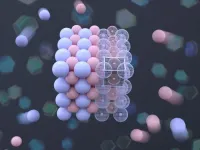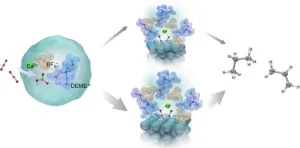Low-dose aspirin reduces inflammation caused by sleep loss
Study finds that low-dose acetylsalicylic acid mitigates the inflammatory consequences of sleep restriction
2024-06-03
(Press-News.org) DARIEN, IL – A new study to be presented at the SLEEP 2024 annual meeting found that low-dose acetylsalicylic acid, also known as aspirin, can reduce inflammatory responses to sleep restriction.
Results show that compared with placebo, preemptive administration of low-dose aspirin during sleep restriction reduced pro-inflammatory responses. Specifically, aspirin reduced interleukin-6 expression and COX-1/COX-2 double positive cells in lipopolysaccharide-stimulated monocytes, as well as C-reactive protein serum levels.
“The novelty of this study is that it investigated whether we can pharmacologically reduce the inflammatory consequences of sleep restriction,” said lead author Larissa Engert, who has a doctorate in behavioral physiology and is a postdoctoral fellow in the department of neurology at Beth Israel Deaconess Medical Center and the division of sleep medicine at Harvard Medical School in Boston. “We used a non-steroidal, anti-inflammatory drug because it has been shown to affect specific inflammatory pathways, which were previously shown to be dysregulated by experimental sleep restriction or sleep disturbances.”
The researchers collected data from 46 healthy adults in a randomized placebo-controlled crossover trial with three protocols – sleep restriction/aspirin, sleep restriction/placebo, and control sleep/placebo – each consisting of a 14-day at-home phase followed by an 11-day in-hospital stay. In the sleep restriction/aspirin condition, participants took low-dose aspirin during the at-home phase and in-hospital stay. Each in-hospital stay started with two nights of an eight-hour sleep opportunity. Then, under the sleep restriction conditions, participants were exposed to five nights of a four-hour sleep opportunity, followed by three nights of recovery sleep. The control sleep condition provided an eight-hour sleep opportunity throughout the in-hospital stay. Sleep and immunologic measures were assessed at baseline and various points throughout the study.
The data also reveal that the aspirin-induced reduction of inflammatory pathway activity in sleep-restricted participants was paralleled by decreased wake after sleep onset and increased sleep efficiency during recovery sleep, Engert noted.
“These findings show that it is possible to blunt inflammatory pathways activated by sleep restriction through preemptive administration of low-dose aspirin. This may foster the development of new therapeutics that specifically target those pathways, and do not exhibit the undesirable side effects associated with aspirin, such as bleeding and stroke. Such therapeutics could complement behavioral sleep improvement therapies to better prevent or control inflammation and its consequences in those experiencing periods of sleep deficiency,” Engert said.
This study was supported by grants from the National Institutes of Health, German Research Foundation, and Sleep Research Society Foundation. The research abstract was published recently in an online supplement of the journal Sleep and will be presented Monday, June 3, and Wednesday, June 5, during SLEEP 2024 in Houston. SLEEP is the annual meeting of the Associated Professional Sleep Societies, a joint venture of the American Academy of Sleep Medicine and the Sleep Research Society.
###
Abstract Title: Using Low-Dose Acetylsalicylic Acid to Target Inflammation in Response to Experimental Sleep Restriction in Humans
Abstract ID: 0174
Oral Presentation Date: Monday, June 3, from 1:45 - 2 p.m. CDT, Room 342DEF
Poster Presentation Date: Wednesday, June 5, from 11-11:45 a.m. CDT, Board 50
Presenter: Larissa Engert, Ph.D.
About the Associated Professional Sleep Societies, LLC
The APSS is a joint venture of the American Academy of Sleep Medicine and the Sleep Research Society. The APSS organizes the SLEEP annual meeting each June (sleepmeeting.org).
About the American Academy of Sleep Medicine
Established in 1975, the AASM advances sleep care and enhances sleep health to improve lives. The AASM has a combined membership of 12,000 accredited sleep centers and individuals, including physicians, scientists and other health care professionals who care for patients with sleep disorders. As the leader in the sleep field, the AASM sets standards and promotes excellence in sleep medicine health care, education and research (aasm.org).
About the Sleep Research Society
The SRS is a professional membership society that advances sleep and circadian science. The SRS provides forums for the exchange of information, establishes and maintains standards of reporting and classifies data in the field of sleep research, and collaborates with other organizations to foster scientific investigation on sleep and its disorders. The SRS also publishes the peer-reviewed, scientific journals Sleep and Sleep Advances (sleepresearchsociety.org).
END
ELSE PRESS RELEASES FROM THIS DATE:
2024-06-03
A team of New York University researchers has created a new way to visualize crystals by peering inside their structures, akin to having X-ray vision. Their new technique—which they aptly named “Crystal Clear”—combines the use of transparent particles and microscopes with lasers that allow scientists to see each unit that makes up the crystal and to create dynamic three-dimensional models.
“This is a powerful platform for studying crystals,” says Stefano Sacanna, professor of chemistry at NYU and the principal investigator for the study, published in the journal Nature ...
2024-06-03
AMHERST, Mass. – A team of scientists led by François Lapointe, a research associate at the University of Massachusetts Amherst, has combined paleoclimatic data from the last 2,000 years with powerful computer modeling and in-the-field research on lake sediments and tree rings to show that an understudied phenomenon, known as atmospheric blocking, has long influenced temperature swings in the Arctic. As temperatures warm due to climate change, atmospheric blocking will help drive ever-wilder weather events. The study focused ...
2024-06-03
Nextdoor is the world’s largest hyperlocal social media network, used by 13% of American adults. Yet little is known about the make-up of the actual neighborhoods—numbering approximately 220,000 across the United States—in which these accounts exist and what people in those communities talk about on the platform.
To address our limited understanding of this population, a team of New York University and University of Michigan researchers generated a demographic portrait of communities in which Nextdoor neighborhoods exist, the presence of public agencies in those communities, and what topics are most often discussed. Using U.S. Census data, other publicly available ...
2024-06-03
Permafrost soils store large quantities of organic carbon and are often portrayed as a critical tipping element in the Earth system, which, once global warming has reached a certain level, suddenly and globally collapses. Yet this image of a ticking timebomb, one that remains relatively quiet until, at a certain level of warming, it goes off, is a controversial one among the research community. Based on the scientific data currently available, the image is deceptive, as an international team led by the Alfred Wegener Institute has shown in a recently released study. According to their findings, there is no single ...
2024-06-03
San Antonio, Texas – June 3, 2024 – Recognizing an unusual prevalence of bloodstream infections (BSI) that threatened extremely ill patients receiving Extracorporeal Membrane Oxygenation, or ECMO, Tampa General Hospital (TGH) infection preventionists started an intervention that eliminated these infections completely from their 18-bed Cardiothoracic Intensive Care Unit (CTICU).
At the APIC 2024 Annual Conference, presenters from the 1,000-bed, tertiary care, academic medical system reported on how they reduced bloodstream infections in ECMO patients from a rate of 36% in October 2021 to a rate of 0% in April 2022. This rate was sustained for seven ...
2024-06-03
The primary cause of lung cancer is smoking. However, the incidence of lung cancer among never-smokers has been steadily increasing, especially among women. While approximately 80% of never-smoking lung cancer patients are prescribed targeted therapies that focus on mutations in proteins such as EGFR and ALK, the remaining patients often receive cytotoxic chemotherapy with high side effects and relatively low response rates, highlighting the urgent need for targeted therapies.
Dr. Lee Cheolju's ...
2024-06-03
Converting CO2 into fuel and chemicals using electricity, also known as electrochemical conversion of CO2, is a promising way to reduce emissions. This process allows us to use carbon captured from industries and the atmosphere and turn it into resources that we usually get from fossil fuels.
To advance ongoing research on efficient electrochemical conversion, scientists from Doshisha University have introduced a cost-effective method to produce valuable hydrocarbons from CO2. The study was made available online on 17 May 2024 and formally published in the journal Electrochimica Acta on 20 July 2024. The research team, led by Professor Takuya Goto and including Ms. Saya Nozaki from ...
2024-06-03
How can someone have alcohol intoxication without consuming alcohol? Auto-brewery syndrome, a rare condition in which gut fungi create alcohol through fermentation, is described in a case study in CMAJ (Canadian Medical Association Journal) https://www.cmaj.ca/lookup/doi/10.1503/cmaj.231319.
“Auto-brewery syndrome carries substantial social, legal, and medical consequences for patients and their loved ones,” writes Dr. Rahel Zewude, University of Toronto, with coauthors. “Our patient had several [emergency department] visits, was assessed by internists and psychiatrists, and was certified ...
2024-06-03
Implementing human papillomavirus (HPV)-based screening in British Columbia could eliminate cervical cancer in the province before 2040, according to a modelling study in CMAJ (Canadian Medical Association Journal) https://www.cmaj.ca/lookup/doi/10.1503/cmaj.231682.
More than 90% of cervical cancer cases worldwide are caused by 9 types of high-risk HPV. The World Health Organization and the Canadian Partnership Against Cancer (CPAC) have both set targets to eliminate cervical cancer by 2040, defined as an annual rate of less than 4 per 100 000 women.
The Pap test has been the primary screening ...
2024-06-03
Berlin, Germany: While influenza infection is a significant public health threat, causing serious illness in between three and five million people worldwide per year and leading to about up to 650,000 deaths, the effectiveness of influenza vaccines varies considerably between individuals depending on vaccine types and individual circumstances. A person’s ability to resist infection (host immunity) plays an important role in this. Now, researchers have developed a way of classifying host immunity in individuals, which may lead to the early identification of those who will not respond well to a regular vaccine schedule and therefore ...
LAST 30 PRESS RELEASES:
[Press-News.org] Low-dose aspirin reduces inflammation caused by sleep loss
Study finds that low-dose acetylsalicylic acid mitigates the inflammatory consequences of sleep restriction




